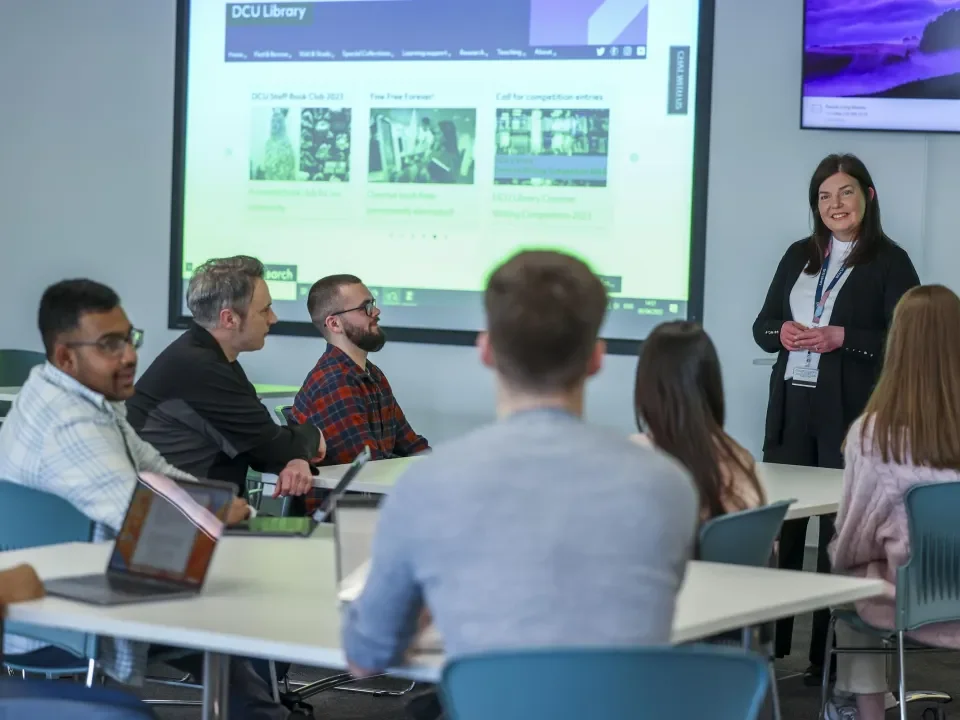
Graduate Training Programme

Subject Librarian delivering a training session
Each year the Library hosts, in collaboration with the DCU Graduate Studies Office, a programme of training aimed at first year Postgraduate Research students. These sessions are delivered by our team of Subject Librarians and by our Open Research Librarian.
All sessions are delivered online, and we will provide login details when students register. Registration forms will be made available when the 2025 programme is announced.
Details for the 2025 programme will be finalised and announced once the academic year 2025/26 has begun.
Please see below for details of the November 2024 Graduate Training programme, to see the types of training sessions provided.
Graduate Training Programme 2024 | 4th to 12th November
Monday, 4th November @ 1pm
- Literature Searching 1: Planning and developing your search strategy
Planning your search carefully will not only save you time but will ensure that you find the relevant literature for your literature review. By taking a structured approach to the search process, you will not only be extremely efficient, but also highly effective.
In this session, we will cover:
- identifying key concepts from your research question
- use of free text vs subject headings
- how to devise your search statement (using the search table)
We will also conduct a live database search using a real life example.
Wednesday, 6th November @ 1pm
- Literature Searching 2: Selecting databases and searching the literature
Once you have developed your search strategy it's important to know what databases and other sources to search for literature on your topic.
In this session, we will look at:
- How to identify discipline specific and multidisciplinary databases
- What citation databases are and how you can use them to help identify relevant literature
We will demonstrate how to search Scopus and Web of Science, both multidisciplinary citation databases.
Thursday, 7th November @ 1pm
- Routes to Open Access for Research Publications
Open Access (OA) publishing options available to DCU staff and research students have greatly improved with the introduction of new transformative publishing agreements. This session explains how you can use these agreements to make your work OA, fulfilling funder requirements and increasing your research impact. We will also outline the benefits of publishing your work via Doras, DCU’s Institutional Repository.
- What is OA?
- Flavours of OA: Green / Gold / Hybrid
- Why should I make my work OA?
- How do I make my work OA?
- OA publishing agreements
- Doras
Open access and Open Research align with the aim of the University’s strategic plan to advance DCU’s research reputation, to ensure that its research reaches a global audience, and with the University’s mission of transforming lives and society.
Monday, 11th November @ 1pm
- Literature searching 3: Managing your results
Managing search results effectively includes selecting and using a suitable reference management tool, this is particularly important as you will be searching multiple databases. This session will introduce you to the Zotero reference management tool and includes:
- How to set up an account
- How to save references from databases and other sources
- Adding citations to a document using your saved reference
Tuesday, 12th November @ 12pm
- Sage Research Methods in Action
Sage Research Methods offers a comprehensive guidance for the researcher in the field of study design, methods, statistics, and analysis. It includes:
- An unparalleled library of resources to support every step of
your project - An in-depth explanation of key research methods of absolutely every field of study
- A step-by-step guidance on how to use all these resources,
through every stage of the research process.
This bespoke training webinar will help you find out more about the Sage Research Methods database, including information on the content and the resources available to your university; this session will also offer information on how to navigate the platform and how to find useful information about the various tools and functions we offer, supporting you to use Sage Research Methods to its full potential.
